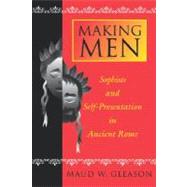Making Men
, by Gleason, Maud- ISBN: 9780691137346 | 069113734X
- Cover: Paperback
- Copyright: 2/4/2008
The careers of two popular second-century rhetorical virtuosos offer Maud Gleason fascinating insights into the ways ancient Romans constructed masculinity during a time marked by anxiety over manly deportment. Declamation was an exhilarating art form for the Greeks and bilingual Romans of the Second Sophistic movement, and its best practitioners would travel the empire performing in front of enraptured audiences. The mastery of rhetoric marked the transition to manhood for all aristocratic citizens and remained crucial to a man's social standing. In treating rhetoric as a process of self-presentation in a face-to-face society, Gleason analyzes the deportment and writings of the two Sophists--Favorinus, a eunuch, and Polemo, a man who met conventional gender expectations--to suggest the ways character and gender were perceived. Physiognomical texts of the era show how intently men scrutinized one another for minute signs of gender deviance in such features as gait, gesture, facial expression, and voice. Rhetoricians trained to develop these traits in a "masculine" fashion. Examining the successful career of Favorinus, whose high-pitched voice and florid presentation contrasted sharply with the traditionalist style of Polemo, Gleason shows, however, that ideal masculine behavior was not a monolithic abstraction. In a highly accessible study treating the semiotics of deportment and the medical, cultural, and moral issues surrounding rhetorical activity, she explores the possibilities of self-presentation in the search for recognition as a speaker and a man.







